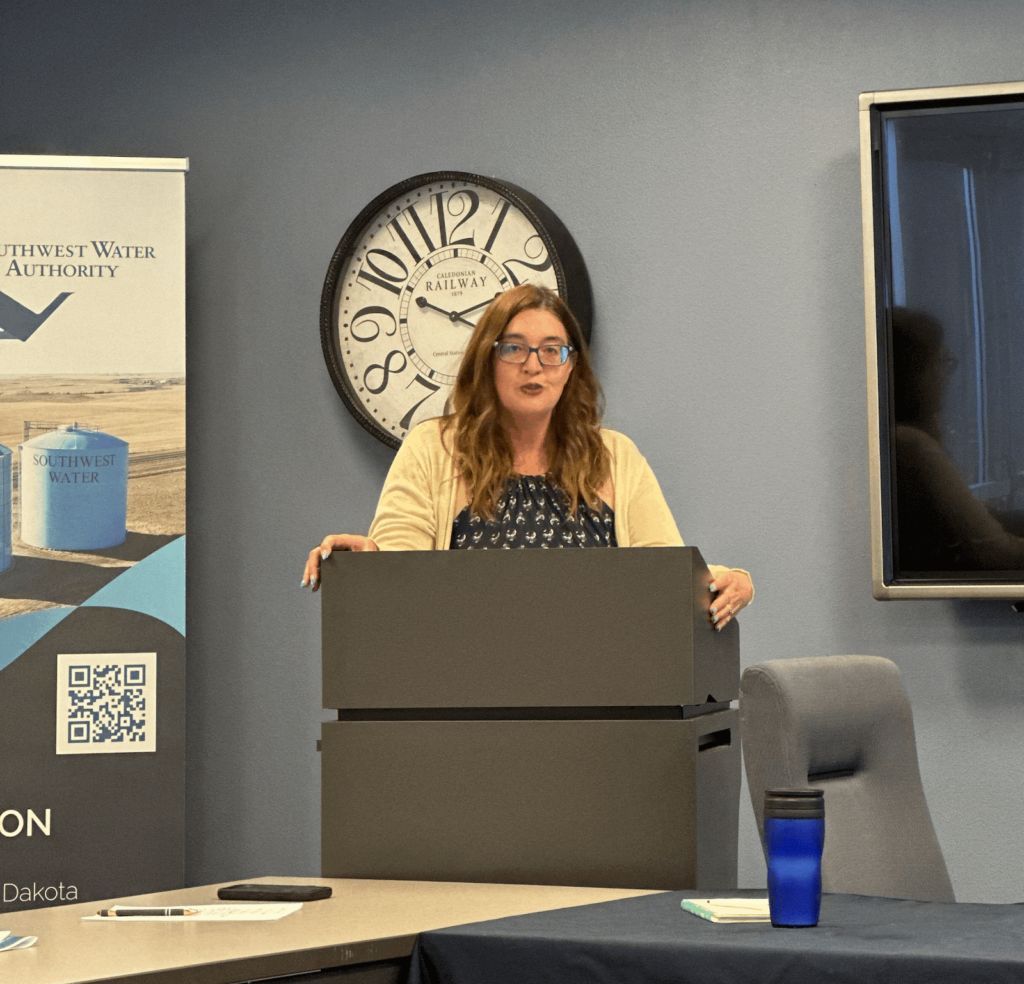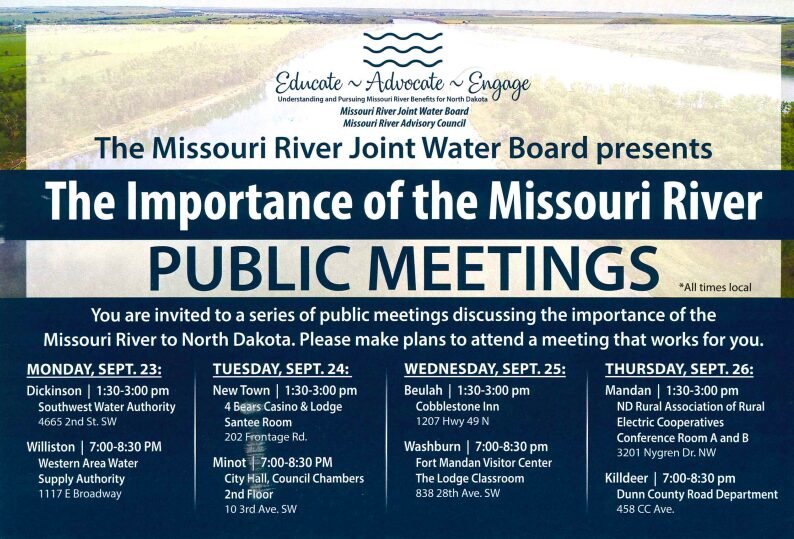Missouri River water managers urge North Dakotans to join in open meetings this week
Continuing to take supply for granted ‘leads to a lack of political clout’

Missouri River in Bismarck (Photo credit/ Grace Fiori).
Leading water managers kicked off a weeklong series of community events to raise awareness about the Missouri River. Beginning Monday in Dickinson, N.D., organizers encouraged public participation in decision-making on North Dakota’s share of the longest waterway in the United States.
The board scheduled two meetings today in Mandan, from 1:30 p.m. to 3 p.m. at the North Dakota Association of Rural Electric Cooperatives, 3201 Nygren Dr. NW; and in Killdeer, from 7 p.m. to 8:30 p.m. at the Dunn County Road Department, 458 CC Ave.
The state-sponsored Missouri River Joint Water Board slated meetings in Williston, New Town, Minot, Beulah, Washburn, Mandan and Kildeer to involve western North Dakota residents. The board’s “Educate, Advocate and Engage” program aims to inform and gather input from stakeholders on the river basin’s economic and ecological benefits.
Recognizing the need, Southwest Water Authority Manager Jen Murray told attendees, “People don’t even know where the Missouri River starts and ends. So what are the other things they don’t know about the Missouri River when it comes to how big of a resource it is to the state of North Dakota?”

Almost 85% of the state’s population relies on drinking water from the river. According to Murray, who manages the rural counties’ water system for the state’s Southwest Water Authority, that number is only projected to grow. In addition to regional drinking water systems, crop irrigation, recreation and mineral extraction rely heavily on the river. However, North Dakotans use less than 1% of the water that flows through the state.
During a public discussion on Sept. 23, state water officials and legislators called attention to the Missouri River’s critical role in people’s daily lives. They said North Dakotans must participate in decision-making to safeguard water rights.
“The general public takes [the Missouri River] for granted and that leads to a lack of political clout,” said Ken Royse, project manager for Missouri River Joint Water Board. North Dakota constituents demand less political advocacy at the national level for basin consumption than those in the downstream states of Kansas, Missouri and Iowa, he said.
“People don’t even know where the Missouri River starts and ends. So what are the other things they don’t know about the Missouri River when it comes to how big of a resource it is to the state of North Dakota?”
Jen Murray, manager of Southwest Water Authority
The Bureau of Reclamation and the U.S. Army Corps of Engineers, which manage basin systems, have considered diverting water from the Missouri River to address western states’ water needs. Rapid population growth, severe drought, and a dwindling Colorado River supply perpetuate water shortages west of the Rocky Mountains.
State officials said North Dakotans need to start using water strategically or risk losing priority in basin management decisions. When negotiated, water compacts mandate how much each state on the Missouri River mainstem can consume.
The federal government protects tribal nations’ water access to the Missouri River, but tribes have no assurance of any specific amount. In order to claim a share of the basin supply, they must demonstrate the economic benefit it would serve.
Success depends on the support of residents and policymakers alike, said James Odermann, chairperson of the Southwest Water Authority board of directors. Monday’s gathering provided an overview of how states and federal agencies manage water.
“The Missouri River is our greatest natural resource,” said state water department engineer Clay Carufel. The discussion featured a presentation on rural distribution systems in southwest North Dakota.
Water management officials were the primary attendees. They conferred with the state lawmakers about the upcoming elections and legislative session. The 2025 legislative session will determine the amount of funding earmarked for regional water systems through the state’s Natural Trust Fund.
Sen. Donald Schaible suggested that the state support initiatives at K-12 schools or colleges and universities to boost North Dakota’s management funding and build political momentum for retaining the Missouri River supply. He said a proposal for expanding the public school curriculum about the water basin has potential.
Sen. Dean Rummel said state management money can vary depending on the year’s political considerations. Regional water system funding could be impacted, Rummel said, by state revenue cutbacks if Measure 4 succeeds in Nov. 5 balloting. The measure would eliminate many property taxes.
The Missouri River Joint Water Board launched the “Educate, Advocate and Engage” program in 2022 after recognizing the need for local shareholders to share a focused strategy. Last fall, the board hosted a series of open sessions east of the Missouri River in Linton, Fargo and Devils Lake. Community feedback was overwhelmingly positive, organizers said, which encouraged them to host sessions within western counties this year.

Lawmakers hope to block Missouri water from being exported to other states, Missouri Independent, Feb. 1, 2024, https://missouriindependent.com/2024/02/01/lawmakers-hope-to-block-missouri-water-from-being-exported-to-other-states/
Colorado River Basin Water Supply and Demand Study, Bureau of Reclamation, 2012, https://www.usbr.gov/lc/region/programs/crbstudy/finalreport/Executive
Missouri River Joint Water Board, https://mrjwb.weebly.com/
Grace Fiori
Former
Talking Circle
At Buffalo's Fire we value constructive dialogue that builds an informed Indian Country. To keep this space healthy, moderators will remove:
- Personal attacks or harassment
- Propaganda, spam, or misinformation
- Rants and off-topic proclamations
Let’s keep the fire burning with respect.







